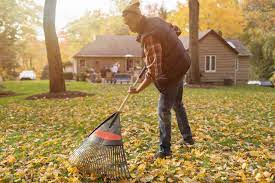Fall is fast approaching, and with it, the time when many families head into the yard armed with rakes, leaf blowers and garbage bags. But this year, agencies like the U.S. Department of Agriculture and the National Wildlife Federation are asking us to “leave the leaves” — that is, skip bagging up fallen leaves and leave them on the ground instead. Why? There are a lot of reasons that benefit plants, animals and the natural landscape.
Why leave the leaves?
First, the most obvious reason: Raking leaves into plastic garbage bags and sending them to a landfill creates huge amounts of unnecessary waste. It also contributes to releasing greenhouse gases that warm the climate and harm the environment. But that’s not the only reason you should skip raking your lawn.
Another reason is that the leaf cover on the ground provides a natural home for small animals that need warm cover to survive the winter.
“Removing leaves also eliminates vital wildlife habitat,” said National Wildlife Federation naturalist David Mizejewski. “Critters ranging from turtles and toads to songbirds, mammals and invertebrates rely on leaf litter for food, shelter and nesting material. Many moth and butterfly caterpillars overwinter in fallen leaves before emerging in spring.”
What about the lawn?
The idea that leaving leaves on your lawn will harm the grass is a misconception, according to experts. In fact, the opposite is true. Leaving fall leaves can help your lawn thrive.
When you let leaves decompose as nature intended, they break down into natural mulch, which is great for the environment. It provides nutrients for the soil that will feed your lawn next spring, as well as your garden and any trees or other plants you have growing in your yard.
“Leaves form a natural mulch that helps suppress weeds and fertilizes the soil as it breaks down,” Mizejewski explained. “Why spend money on mulch and fertilizer when you can make your own?”
How to manage leaves without removing them completely
” alt=”” aria-hidden=”true” /> That’s not to say fall is now lawn-maintenance-free. There are still some things you can (and should) do to help set your yard up for success next spring.
First, the leaves will make more effective mulch if they’re chopped up into smaller pieces. For this, experts recommend running a lawn mower over them without the bag attachment. Some lawn mowers even have a mulching attachment added for this purpose.
You can also rake the leaves into your garden or flower beds (or anywhere else that could use extra mulch). It’s a good idea to spread the leaves around to avoid deep spots that might smother parts of your lawn.








































